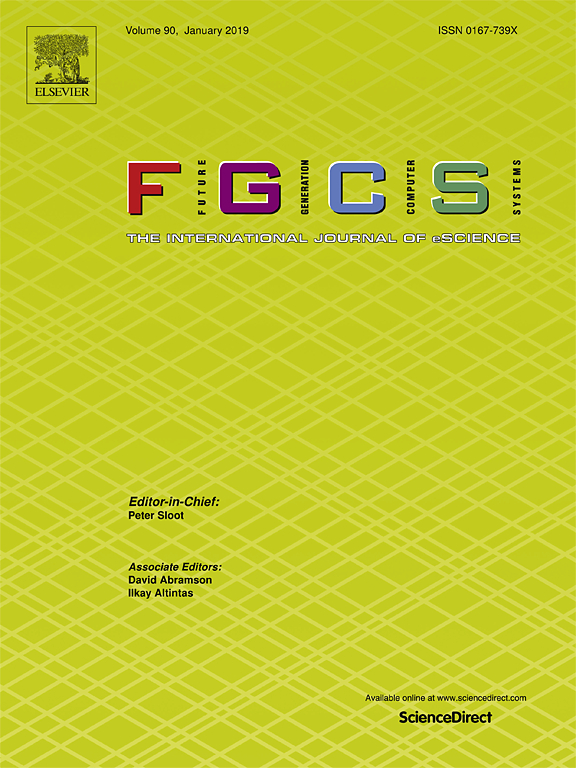Editorial Board
A survey and taxonomy of resource optimisation for executing bag-of-task applications on public clouds
A game theory based multi layered intrusion detection framework for VANET
Multi criteria biased randomized method for resource allocation in distributed systems: Application in a volunteer computing system
Supporting selective undo of string-wise operations for collaborative editing systems
Estimation of privacy risk through centrality metrics
User experience and interaction performance in 2D/3D telecollaboration
Semi-online task assignment policies for workload consolidation in cloud computing systems
A distributed approach to compliance monitoring of business process event streams
Using general master equation for feature fusion
Concurrent hash tables on multicore machines: Comparison, evaluation and implications
Low illumination underwater light field images reconstruction using deep convolutional neural networks
Osseous and digital subtraction angiography image fusion via various enhancement schemes and Laplacian pyramid transformations
Two-dimensional gray scale image denoising via morphological operations in NSST domain & bitonic filtering
Unsharp masking approaches for HVS based enhancement of mammographic masses: A comparative evaluation
Link based BPSO for feature selection in big data text clustering
A survey on routing protocols supported by the Contiki Internet of things operating system
An on-demand coverage based self-deployment algorithm for big data perception in mobile sensing networks
Performance measurement of data flow processing employing software defined architecture
Cost optimization for deadline-aware scheduling of big-data processing jobs on clouds
Distributed parallel cooperative coevolutionary multi-objective large-scale immune algorithm for deployment of wireless sensor networks
The IoT as a tool to combine the scheduling of the irrigation with the geostatistics of the soils
Towards a formally verified zero watermarking scheme for data integrity in the Internet of Things based-wireless sensor networks
A zero-watermarking algorithm for privacy protection in biomedical signals
Cellular Automata-based Improved Ant Colony-based Optimization Algorithm for mitigating DDoS attacks in VANETs
Exploring relationship between indistinguishability-based and unpredictability-based RFID privacy models
Mobile Couriers’ selection for the Smart-grid in Smart-cities’ Pervasive Sensing
A privacy-preserving and accountable authentication protocol for IoT end-devices with weaker identity
Efficient IoT-based sensor BIG Data collection–processing and analysis in smart buildings
MQRP: Mobile sinks-based QoS-aware data gathering protocol for wireless sensor networks-based smart grid applications in the context of industry 4.0-based on internet of things
A new architecture of Internet of Things and big data ecosystem for secured smart healthcare monitoring and alerting system
An information provision system to promote energy conservation and maintain indoor comfort in smart homes using sensed data by IoT sensors
IoT security: Review, blockchain solutions, and open challenges
Non-parametric sequence-based learning approach for outlier detection in IoT
An Internet of Things-based health prescription assistant and its security system design
Bloom filter based optimization scheme for massive data handling in IoT environment
On the road to exascale: Advances in High Performance Computing and Simulations—An overview and editorial
Congestion-aware core mapping for Network-on-Chip based systems using betweenness centrality
Multi-core versus many-core computing for many-task Branch-and-Bound applied to big optimization problems
Non-standard pseudo random number generators revisited for GPUs
The home-forwarding mechanism to reduce the cache coherence overhead in next-generation CMPs
Accurately modeling the on-chip and off-chip GPU memory subsystem
Locality based warp scheduling in GPGPUs
Analysis of classic algorithms on highly-threaded many-core architectures
Gathering requirements for advancing simulations in HPC infrastructures via science gateways
Tuning linear algebra for energy efficiency on multicore machines by adapting the ATLAS library
Wind field parallelization based on Schwarz alternating domain decomposition method
Highly scalable SFC-based dynamic load balancing and its application to atmospheric modeling
Scheduling parallel tasks with energy and time constraints on multiple manycore processors in a cloud computing environment
Optical packet switching in HPC. An analysis of applications performance
Completely Automated Public Physical test to tell Computers and Humans Apart: A usability study on mobile devices
MemEFS: A network-aware elastic in-memory runtime distributed file system
234Compositor: A flexible parallel image compositing framework for massively parallel visualization environments
A task-efficient sink node based on embedded multi-core SoC for Internet of Things
Social Internet of Things: Applications, architectures and protocols
Collaborative QoS prediction with context-sensitive matrix factorization
Efficient multiple incremental computation for Kernel Ridge Regression with Bayesian uncertainty modeling
A source location protection protocol based on dynamic routing in WSNs for the Social Internet of Things
Mining and updating association rules based on fuzzy concept lattice
A cross layer protocol for traffic management in Social Internet of Vehicles
Toward modeling and optimization of features selection in Big Data based social Internet of Things
A lightweight and robust two-factor authentication scheme for personalized healthcare systems using wireless medical sensor networks
Flexible data access control in D2D communications
Game theory-based Security Vulnerability Quantification for Social Internet of Things
Distributed attack detection scheme using deep learning approach for Internet of Things
An analysis of security systems for electronic information for establishing secure internet of things environments: Focusing on research trends in the security field in South Korea


